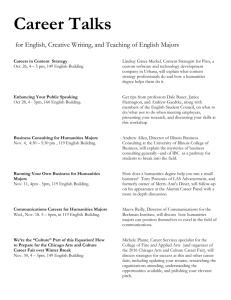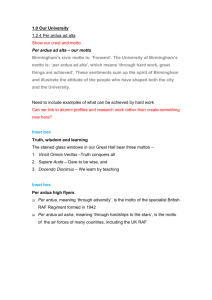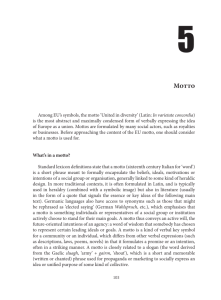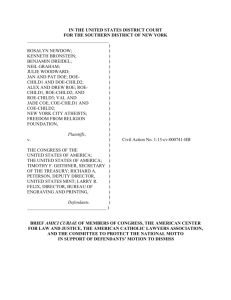The Six Colleges: A Quick Comparison
advertisement
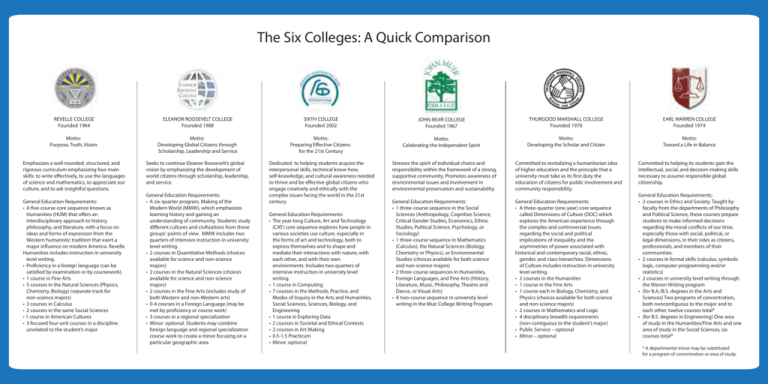
The Six Colleges: A Quick Comparison REVELLE COLLEGE Founded 1964 ELEANOR ROOSEVELT COLLEGE Founded 1988 SIXTH COLLEGE Founded 2002 JOHN MUIR COLLEGE Founded 1967 THURGOOD MARSHALL COLLEGE Founded 1970 EARL WARREN COLLEGE Founded 1974 Motto: Purpose, Truth, Vision Motto: Developing Global Citizens through Scholarship, Leadership and Service Motto: Preparing Effective Citizens for the 21st Century Motto: Celebrating the Independent Spirit Motto: Developing the Scholar and Citizen Motto: Toward a Life in Balance Emphasizes a well-rounded, structured, and rigorous curriculum emphasizing four main skills: to write effectively, to use the languages of science and mathematics, to appreciate our culture, and to ask insightful questions. Seeks to continue Eleanor Roosevelt’s global vision by emphasizing the development of world citizens through scholarship, leadership, and service. Dedicated to helping students acquire the interpersonal skills, technical know-how, self-knowledge, and cultural awareness needed to thrive and be effective global citizens who engage creatively and ethically with the complex issues facing the world in the 21st century. General Education Requirements: • A five-course core sequence known as Humanities (HUM) that offers an interdisciplinary approach to history, philosophy, and literature, with a focus on ideas and forms of expression from the Western humanistic tradition that exert a major influence on modern America. Revelle Humanities includes instruction in university level writing. • Proficiency in a foreign language (can be satisfied by examination or by coursework). • 1 course in Fine Arts • 5 courses in the Natural Sciences (Physics, Chemistry, Biology) (separate track for non-science majors) • 3 courses in Calculus • 2 courses in the same Social Sciences • 1 course in American Cultures • 3 focused four-unit courses in a discipline unrelated to the student’s major General Education Requirements: • A six-quarter program, Making of the Modern World (MMW), which emphasizes learning history and gaining an understanding of community. Students study different cultures and civilizations from those groups' points of view. MMW includes two quarters of intensive instruction in university level writing. • 2 courses in Quantitative Methods (choices available for science and non-science majors) • 2 courses in the Natural Sciences (choices available for science and non-science majors) • 2 courses in the Fine Arts (includes study of both Western and non-Western arts) • 0-4 courses in a Foreign Language (may be met by proficiency or course work) • 3 courses in a regional specialization • Minor: optional. Students may combine foreign language and regional specialization course work to create a minor focusing on a particular geographic area. General Education Requirements: • The year-long Culture, Art and Technology (CAT) core sequence explores how people in various societies use culture, especially in the forms of art and technology, both to express themselves and to shape and mediate their interactions with nature, with each other, and with their own environments. Includes two quarters of intensive instruction in university level writing. • 1 course in Computing • 7 courses in the Methods, Practice, and Modes of Inquiry in the Arts and Humanities, Social Sciences, Sciences, Biology, and Engineering • 1 course in Exploring Data • 2 courses in Societal and Ethical Contexts • 2 courses in Art Making • 0.5-1.5 Practicum • Minor: optional Stresses the spirit of individual choice and responsibility within the framework of a strong, supportive community. Promotes awareness of environmental issues and involvement in environmental preservation and sustainability. Committed to revitalizing a humanitarian idea of higher education and the principle that a university must take as its first duty the education of citizens for public involvement and community responsibility. General Education Requirements: • 1 three-course sequence in the Social Sciences (Anthropology, Cognitive Science, Critical Gender Studies, Economics, Ethnic Studies, Political Science, Psychology, or Sociology) • 1 three-course sequence in Mathematics (Calculus), the Natural Sciences (Biology, Chemistry or Physics), or Environmental Studies (choices available for both science and non-science majors) • 2 three-course sequences in Humanities, Foreign Languages, and Fine Arts (History, Literature, Music, Philosophy, Theatre and Dance, or Visual Arts) • A two-course sequence in university level writing in the Muir College Writing Program General Education Requirements: • A three-quarter (one-year) core sequence called Dimensions of Culture (DOC) which explores the American experience through the complex and controversial issues regarding the social and political implications of inequality and the asymmetries of power associated with historical and contemporary racial, ethnic, gender, and class hierarchies. Dimensions of Culture includes instruction in university level writing. • 2 courses in the Humanities • 1 course in the Fine Arts • 1 course each in Biology, Chemistry, and Physics (choices available for both science and non-science majors) • 2 courses in Mathematics and Logic • 4 disciplinary breadth requirements (non-contiguous to the student’s major) • Public Service – optional • Minor – optional Committed to helping its students gain the intellectual, social, and decision-making skills necessary to assume responsible global citizenship. General Education Requirements; • 2 courses in Ethics and Society. Taught by faculty from the departments of Philosophy and Political Science, these courses prepare students to make informed decisions regarding the moral conflicts of our time, especially those with social, political, or legal dimensions, in their roles as citizens, professionals, and members of their communities. • 2 courses in formal skills (calculus, symbolic logic, computer programming and/or statistics) • 2 courses in university level writing through the Warren Writing program • (for B.A./B.S. degrees in the Arts and Sciences) Two programs of concentration, both noncontiguous to the major and to each other, twelve courses total* • (for B.S. degrees in Engineering) One area of study in the Humanities/Fine Arts and one area of study in the Social Sciences, six courses total* * A departmental minor may be substituted for a program of concentration or area of study.
